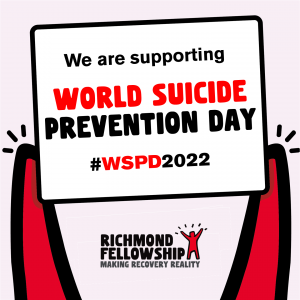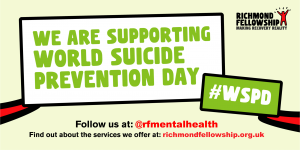World Suicide Prevention Day 2022: Kennedy’s blog
 Richmond Fellowship runs a number of crisis houses and Havens across England to provide immediate intervention for someone who is experiencing a mental health crisis.
Richmond Fellowship runs a number of crisis houses and Havens across England to provide immediate intervention for someone who is experiencing a mental health crisis.
Our services are warm, welcoming and provide respite when people need it the most. They also support the NHS, emergency services and other providers.
For World Suicide Prevention Day 2022, Kennedy, Senior Practitioner at our Central Lancashire Haven explains what her service does in supporting people with suicidal thoughts, and the steps they put in place to help people along their recovery journeys.
What is The Central Lancashire Haven?
The Haven is a short-term mental health service based in Preston, Lancashire. We run a drop-in service that individuals can attend when they are experiencing a mental health crisis. At the Haven, we support individuals from every walk of life, whether it be for managing anxiety or dealing with intrusive thoughts. We have support available for everyone.
One of the topics of support we offer is around suicidal ideation, and how to keep safe when experiencing suicidal thoughts.
Firstly, we want you to know that you are not alone in having these thoughts. Suicidal thoughts can be confusing and scary, especially if it is the first time you are dealing with them. Often you may feel hopeless or trapped, and sometimes people feel tempted to do risky or reckless things because they may not care what happens to them. We want you to know that if you are feeling this way, we can help.
How can the Haven help me if I’m experiencing suicidal thoughts?
Firstly, as we operate a drop-in service, this means we are easily accessible to anyone needing support of any kind. We are also open 12 hours a day, every day, 365 days a year. You do not need an appointment to access the Haven. If you are experiencing suicidal thoughts, you can drop in, or give us a call. One of our fantastic Crisis Recovery Workers will then be there to give support and guidance.
When you come into the Haven, you will be greeted by a member of our team and will be guided into our relaxing Welcome room. In here, you will be able to sit with the Crisis Recovery Worker and tell them what is happening in your mind. You can talk about what is impacting your mental health and come up with a support plan on how to cope with suicidal thoughts.
The Haven staff will provide you with coping skills and de-escalation techniques to use when you are experiencing a crisis. We will also schedule some support with the Haven and offer an assessment with our registered Mental Health Practitioner. If it is agreed that you may benefit from further support, we will provide signposting to other relevant services.
The Haven also runs many groups, so we often encourage people to join these as we find that reducing social isolation during a crisis can often result in a positive outcome.
If you are feeling suicidal and are unsure of who you can speak to our of service hours, you can call the Samaritans on freephone 116 123 or your local Crisis Team.
Grounding technique to help distract the mind when experiencing suicidal thoughts.
The 5-4-3-2-1 technique uses the five senses to distract the mind when in a moment of crisis. Doing this technique can help ground you in the moment and allow for your mind to have some time to free itself of negative thoughts.
-
What are 5 things you can see? Look for small details – the more details you can identify and focus on, the longer you remain distracted.
-
What are 4 things you can feel? Run your finger up and down your arm, pay attention to the feeling of this. Does it tickle? Is it relaxing? What else can you feel?
-
What are 3 things you can hear? Pay close attention to your surroundings. Can you hear cars? Is there music playing? If so, do you like the song that is playing?
-
What are 2 things you can smell? Try to recognise some of the smells in the air. Do you have a favourite perfume that you can spray that holds positive memories?
-
What is 1 thing you can taste? Using a strong mint or some chewing gum is a great technique for this step. The strength of the mint can help you to take in a deep breathe, which opens up your airways and sends signals to the body’s relaxation system indicating that you need to relax your mind and body.
Inspired by our work? Did you know Richmond Fellowship is a national mental health charity and your donations to services really help the people using our services by providing activities to support their recovery? To donate to The Central Lancashire Haven, click here.





















